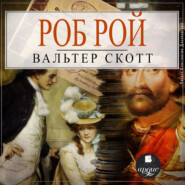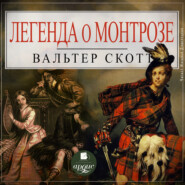По всем вопросам обращайтесь на: info@litportal.ru
(©) 2003-2024.
✖
The Fortunes of Nigel
Настройки чтения
Размер шрифта
Высота строк
Поля
“Laurie is as honest a lad as ever lifted a ladle,” said Richie; “not but what I dare to say he can lick his fingers like other folk, and reason good. But, in fine, for I see your honour is waxing impatient, he brought me to the palace, where a’ was astir for the king going out to hunt or hawk on Blackheath, I think they ca’d it. And there was a horse stood with all the quarries about it, a bonny grey as ever was foaled; and the saddle and the stirrups, and the curb and bit, o’ burning gowd, or silver gilded at least; and down, sir, came the king, with all his nobles, dressed out in his hunting-suit of green, doubly laced, and laid down with gowd. I minded the very face o’ him, though it was lang since I saw him. But my certie, lad, thought I, times are changed since ye came fleeing down the back stairs of auld Holyrood House, in grit fear, having your breeks in your hand without time to put them on, and Frank Stewart, the wild Earl of Bothwell, hard at your haunches; and if auld Lord Glenvarloch hadna cast his mantle about his arm, and taken bluidy wounds mair than ane in your behalf, you wald not have craw’d sae crouse this day; and so saying, I could not but think your lordship’s Sifflication could not be less than most acceptable; and so I banged in among the crowd of lords. Laurie thought me mad, and held me by the cloak-lap till the cloth rave in his hand; and so I banged in right before the king just as he mounted, and crammed the Sifflication into his hand, and he opened it like in amaze; and just as he saw the first line, I was minded to make a reverence, and I had the ill luck to hit his jaud o’ a beast on the nose with my hat, and scaur the creature, and she swarved aside, and the king, that sits na mickle better than a draff-pock on the saddle, was like to have gotten a clean coup, and that might have cost my craig a raxing-and he flung down the paper amang the beast’s feet, and cried, ‘Away wi’ the fause loon that brought it!’ And they grippit me, and cried treason; and I thought of the Ruthvens that were dirked in their ain house, for, it may be, as small a forfeit. However, they spak only of scourging me, and had me away to the porter’s lodge to try the tawse on my back, and I was crying mercy as loud as I could; and the king, when he had righted himself on the saddle, and gathered his breath, cried to do me nae harm; for, said he, he is ane of our ain Norland stots, I ken by the rowt of him, – and they a’ laughed and rowted loud eneugh. And then he said, ‘Gie him a copy of the Proclamation, and let him go down to the North by the next light collier, before waur come o’t.’ So they let me go, and rode out, a sniggering, laughing, and rounding in ilk ither’s lugs. A sair life I had wi’ Laurie Linklater; for he said it wad be the ruin of him. And then, when I told him it was in your matter, he said if he had known before he would have risked a scauding for you, because he minded the brave old lord, your father. And then he showed how I suld have done, – and that I suld have held up my hand to my brow, as if the grandeur of the king and his horse-graith thegither had casten the glaiks in my een, and mair jackanape tricks I suld hae played, instead of offering the Sifflication, he said, as if I had been bringing guts to a bear.” [Footnote: I am certain this prudential advice is not original on Mr. Linklater’s part, but I am not at present able to produce my authority. I think it amounted to this, that James flung down a petition presented by some supplicant who paid no compliments to his horse, and expressed no admiration at the splendour of his furniture, saying, “Shall a king cumber himself about the petition of a beggar, while the beggar disregards the king’s splendour?” It is, I think, Sir John Harrington who recommends, as a sure mode to the king’s favour, to praise the paces of the royal palfrey.]
‘For,’ said he, ‘Richie, the king is a weel-natured and just man of his ain kindly nature, but he has a wheen maggots that maun be cannily guided; and then, Richie,’ says he, in a very laigh tone, ‘I would tell it to nane but a wise man like yoursell, but the king has them about him wad corrupt an angel from heaven; but I could have gi’en you avisement how to have guided him, but now it’s like after meat mustard.’ – ‘Aweel, aweel, Laurie,’ said I, ‘it may be as you say’, but since I am clear of the tawse and the porter’s lodge, sifflicate wha like, deil hae Richie Moniplies if he come sifflicating here again.’ – And so away I came, and I wasna far by the Temple Port, or Bar, or whatever they ca’ it, when I met with the misadventure that I tauld you of before.”
“Well, my honest Richie,” said Lord Nigel, “your attempt was well meant, and not so ill conducted, I think, as to have deserved so bad an issue; but go to your beef and mustard, and we’ll talk of the rest afterwards.”
“There is nae mair to be spoken, sir,” said his follower, “except that I met ane very honest, fair-spoken, weel-put-on gentleman, or rather burgher, as I think, that was in the whigmaleery man’s back-shop; and when he learned wha I was, behold he was a kindly Scot himsell, and, what is more, a town’s-bairn o’ the gude town, and he behoved to compel me to take this Portugal piece, to drink, forsooth – my certie, thought I, we ken better, for we will eat it – and he spoke of paying your lordship a visit.”
“You did not tell him where I lived, you knave?” said the Lord Nigel, angrily. “‘Sdeath! I shall have every clownish burgher from Edinburgh come to gaze on my distress, and pay a shilling for having seen the motion of the Poor Noble!”
“Tell him where you lived?” said Richie, evading the question; “How could I tell him what I kendna mysell? If I had minded the name of the wynd, I need not have slept in the kirkyard yestreen.”
“See, then, that you give no one notice of our lodging,” said the young nobleman; “those with whom I have business I can meet at Paul’s, or in the Court of Requests.”
“This is steeking the stable-door when the steed is stolen,” thought Richie to himself; “but I must put him on another pin.”
So thinking, he asked the young lord what was in the Proclamation which he still held folded in his hand; “for, having little time to spell at it,” said he, “your lordship well knows I ken nought about it but the grand blazon at the tap – the lion has gotten a claught of our auld Scottish shield now, but it was as weel upheld when it had a unicorn on ilk side of it.”
Lord Nigel read the Proclamation, and he coloured deep with shame and indignation as he read; for the purport was, to his injured feelings, like the pouring of ardent spirits upon a recent wound.
“What deil’s in the paper, my lord?” said Richie, unable to suppress his curiosity as he observed his master change colour; “I wadna ask such a thing, only the Proclamation is not a private thing, but is meant for a’ men’s hearing.”
“It is indeed meant for all men’s hearing,” replied Lord Nigel, “and it proclaims the shame of our country, and the ingratitude of our Prince.”
“Now the Lord preserve us! and to publish it in London, too!” ejaculated Moniplies.
“Hark ye, Richard,” said Nigel Olifaunt, “in this paper the Lords of the Council set forth, that, ‘in consideration of the resort of idle persons of low condition forth from his Majesty’s kingdom of Scotland to his English Court – filling the same with their suits and supplications, and dishonouring the royal presence with their base, poor, and beggarly persons, to the disgrace of their country in the estimation of the English; these are to prohibit the skippers, masters of vessels and others, in every part of Scotland, from bringing such miserable creatures up to Court under pain of fine and impisonment.”’
“I marle the skipper took us on board,” said Richie.
“Then you need not marvel how you are to get back again,” said Lord Nigel, “for here is a clause which says, that such idle suitors are to be transported back to Scotland at his Majesty’s expense, and punished for their audacity with stripes, stocking, or incarceration, according to their demerits – that is to say, I suppose, according to the degree of their poverty, for I see no other demerit specified.”
“This will scarcely,” said Richie, “square with our old proverb —
A King’s face
Should give grace —
But what says the paper farther, my lord?”
“O, only a small clause which especially concerns us, making some still heavier denunciations against those suitors who shall be so bold as to approach the Court, under pretext of seeking payment of old debts due to them by the king, which, the paper states, is, of all species of importunity, that which is most odious to his Majesty.”
“The king has neighbours in that matter,” said Richie; “but it is not every one that can shift off that sort of cattle so easily as he does.”
Their conversation was here interrupted by a knocking at the door. Olifaunt looked out at the window, and saw an elderly respectable person whom he knew not. Richie also peeped, and recognised, but, recognising, chose not to acknowledge, his friend of the preceding evening. Afraid that his share in the visit might be detected, he made his escape out of the apartment under pretext of going to his breakfast; and left their landlady the task of ushering Master George into Lord Nigel’s apartment, which she performed with much courtesy.
CHAPTER IV
Ay, sir, the clouted shoe hath oft times craft in’t,
As says the rustic proverb; and your citizen,
In’s grogram suit, gold chain, and well-black’d shoes,
Bears under his flat cap ofttimes a brain
Wiser than burns beneath the cap and feather,
Or seethes within the statesman’s velvet nightcap.
Read me my Riddle.
The young Scottish nobleman received the citizen with distant politeness, expressing that sort of reserve by which those of the higher ranks are sometimes willing to make a plebeian sensible that he is an intruder. But Master George seemed neither displeased nor disconcerted. He assumed the chair, which, in deference to his respectable appearance, Lord Nigel offered to him, and said, after a moment’s pause, during which he had looked attentively at the young man, with respect not unmingled with emotion – “You will forgive me for this rudeness, my lord; but I was endeavouring to trace in your youthful countenance the features of my good old lord, your excellent father.”
There was a moment’s pause ere young Glenvarloch replied, still with a reserved manner, – “I have been reckoned like my father, sir; and am happy to see any one that respects his memory. But the business which calls me to this city is of a hasty as well as a private nature, and – ”
“I understand the hint, my lord,” said Master George, “and would not be guilty of long detaining you from business, or more agreeable conversation. My errand is almost done when I have said that my name is George Heriot, warmly befriended, and introduced into the employment of the Royal Family of Scotland, more than twenty years since, by your excellent father; and that, learning from a follower of yours that your lordship was in this city in prosecution of some business of importance, it is my duty, – it is my pleasure, – to wait on the son of my respected patron; and, as I am somewhat known both at the Court, and in the city, to offer him such aid in the furthering of his affairs as my credit and experience may be able to afford.”
“I have no doubt of either, Master Heriot,” said Lord Nigel, “and I thank you heartily for the good-will with which you have placed them at a stranger’s disposal; but my business at Court is done and ended, and I intend to leave London and, indeed, the island, for foreign travel and military service. I may add, that the suddenness of my departure occasions my having little time at my disposal.”
Master Heriot did not take the hint, but sat fast, with an embarrassed countenance however, like one who had something to say that he knew not exactly how to make effectual. At length he said, with a dubious smile, “You are fortunate, my lord, in having so soon dispatched your business at Court. Your talking landlady informs me you have been but a fortnight in this city. It is usually months and years ere the Court and a suitor shake hands and part.”
“My business,” said Lord Nigel, with a brevity which was intended to stop further discussion, “was summarily dispatched.”
Still Master Heriot remained seated, and there was a cordial good-humour added to the reverence of his appearance, which rendered it impossible for Lord Nigel to be more explicit in requesting his absence.
“Your lordship has not yet had time,” said the citizen, still attempting to sustain the conversation, “to visit the places of amusement, – the playhouses, and other places to which youth resort. But I see in your lordship’s hand one of the new-invented plots of the piece, [Footnote: Meaning, probably, playbills.] which they hand about of late – May I ask what play?”
“Oh! a well-known piece,” said Lord Nigel, impatiently throwing down the Proclamation, which he had hitherto been twisting to and fro in his hand, – “an excellent and well-approved piece —A New Way to Pay Old Debts.”
Master Heriot stooped down, saying, “Ah! my old acquaintance, Philip Massinger;” but, having opened the paper and seen the purport, he looked at Lord Nigel with surprise, saying, “I trust your lordship does not think this prohibition can extend either to your person or your claims?”
“I should scarce have thought so myself,” said the young nobleman; “but so it proves. His Majesty, to close this discourse at once, has been pleased to send me this Proclamation, in answer to a respectful Supplication for the repayment of large loans advanced by my father for the service of the State, in the king’s utmost emergencies.”
“It is impossible!” said the citizen – “it is absolutely impossible! – If the king could forget what was due to your father’s memory, still he would not have wished – would not, I may say, have dared – to be so flagrantly unjust to the memory of such a man as your father, who, dead in the body, will long live in the memory of the Scottish people.”
“I should have been of your opinion,” answered Lord Nigel, in the same tone as before; “but there is no fighting with facts.”
“What was the tenor of this Supplication?” said Heriot; “or by whom was it presented? Something strange there must have been in the contents, or else – ”
“You may see my original draught,” said the young lord, taking it out of a small travelling strong-box; “the technical part is by my lawyer in Scotland, a skilful and sensible man; the rest is my own, drawn, I hope, with due deference and modesty.”
Master Heriot hastly cast his eye over the draught. “Nothing,” he said, “can be more well-tempered and respectful. Is it possible the king can have treated this petition with contempt?”
“He threw it down on the pavement,” said the Lord of Glenvarloch, “and sent me for answer that Proclamation, in which he classes me with the paupers and mendicants from Scotland, who disgrace his Court in the eyes of the proud English – that is all. Had not my father stood by him with heart, sword, and fortune, he might never have seen the Court of England himself.”
“But by whom was this Supplication presented, my lord?” said Heriot; “for the distaste taken at the messenger will sometimes extend itself to the message.”
“By my servant,” said the Lord Nigel; “by the man you saw, and, I think, were kind to.”
“By your servant, my lord?” said the citizen; “he seems a shrewd fellow, and doubtless a faithful; but surely – ”
“You would say,” said Lord Nigel, “he is no fit messenger to a king’s presence? – Surely he is not; but what could I do? Every attempt I had made to lay my case before the king had miscarried, and my petitions got no farther than the budgets of clerks and secretaries; this fellow pretended he had a friend in the household that would bring him to the king’s presence, – and so – ”
“I understand,” said Heriot; “but, my lord, why should you not, in right of your rank and birth, have appeared at Court, and required an audience, which could not have been denied to you?”

















